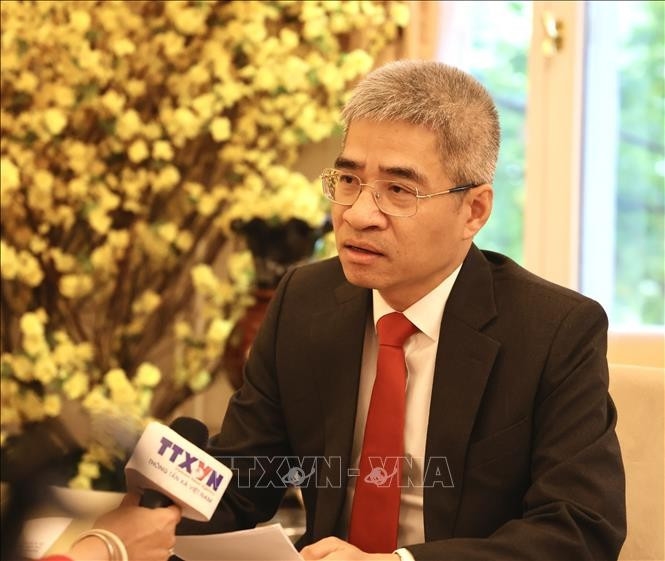The foundation of the bilateral ties rests on decades of unique people-to-people exchanges. From President Ho Chi Minh’s time in Berlin in the early 20th century to the mid-century influx of Vietnamese officials, engineers, students, and workers in Germany, who have become cultural bridges and deepened mutual understanding between the two nations, Thanh said.
    |
 |
|
Vietnamese Ambassador to Germany Nguyen Dac Thanh |
In terms of diplomacy, politics and security, the 2011 Hanoi Declaration on the establishment of Vietnam - Germany Strategic Partnership paved the way for frequent high-level visits, ministry exchanges, and local-level engagements. Party-to-party and people-to-people diplomacy have deepened, with the Communist Party of Vietnam holding high-level theoretical dialogues with both the Social Democratic Party (SPD) and the Left Party of Germany.
National defense-security cooperation has made notable strides, becoming a key pillar of the Strategic Partnership amid rising global geopolitical challenges. In November 2022, the two defense ministries signed a cooperation agreement, setting a comprehensive framework for the exchange of delegations, strategic sharing, training, military medicine and peacekeeping.
Both sides share a common vision on multilateralism, maintaining a rules-based order, upholding international law, the United Nations Charter and its principles, he added.
For economic and trade ties, Germany ranks as Vietnam’s top trade partner in the European Union (E.U.) and its 12th in the world, with two-way trade doubling from 5.6 billion USD in 2011 to 11.1 billion USD in 2024. As Vietnam’s fourth largest European investor, Germany sees the Southeast Asian nation as a key destination for supply chain diversification. German enterprises are increasingly interested in Vietnam’s investment climate to avoid overreliance on a single market.
Judicial, scientific, educational, healthcare, socio-cultural, and tourism ties continue to yield results. Germany ranks among Vietnam’s top 10 tourism markets, with German visitors benefiting from a 45-day visa waiver since 2023. The Vietnamese community, numbering several hundred thousand in Germany, remains a vital link in the bilateral relations.
A key advantage in Vietnam - Germany relations is that cooperation initiatives align with the policy orientations of both sides, serving the shared interests of their people, businesses and localities, Thanh noted.
Looking ahead, he saw vast potential in trade, investment, sci-tech, and innovation as Vietnam gears up for a new growth phase and Germany’s coalition government prioritizes economic issues. Both countries are pushing for swift ratification of the E.U. - Vietnam Investment Protection Agreement (EVIPA) to boost momentum. Vietnamese firms should leverage the E.U. - Vietnam Free Trade Agreement (EVFTA) in agriculture, apparel, and electronics, while German investors eye opportunities in digital transformation, energy transition, financial centers, and infrastructure projects like high-speed rail, airports, and energy.
The two nations have also pledged to cooperate in environmental protection and sustainable development, scaling up renewable energy, water resource management and biodiversity projects. Labor cooperation and vocational training are expanding to meet German demand for skilled workers, he said.
According to the ambassador, both nations have coordinated a series of activities to mark 50th anniversary of diplomatic ties in their capitals since early 2025. Recent celebrations in Berlin marked Vietnam’s 80th National Day and the 50th anniversary of diplomatic ties. A German Festival is also planned for October 2025 at Hanoi’s Hoan Kiem Lake.
Vietnam welcomes visits by German government leaders, foreign ministry and local officials. The Vietnamese Embassy in Germany also looks forward to hosting a high-ranking delegation from the Vietnamese Government on an official visit to Germany in 2025 to reaffirm the two governments’ political commitment to elevating the strategic partnership and meeting the expectations of German businesses operating in Vietnam, he said.
Asked about key focuses of bilateral cooperation in 2025 and beyond, Thanh underscored intensified contacts and exchanges across Party, State, parliamentary and people-to-people channels, with a focus on making sci-tech and innovation a new pillar of the Strategic Partnership. He stressed the need to leverage existing cooperation mechanisms to tap strengths and favorable conditions so that the Vietnam - Germany Strategic Partnership best serves the governments and peoples of both countries, contributing to peace, prosperity, sustainable development and innovation.
On necessary steps to further develop the bilateral ties, he suggested maintaining and setting up regular dialogue mechanisms at various levels to track the progress of agreements. New dialogue frameworks could also be considered to adapt to rapid global changes.
The diplomat also proposed increased cooperation at multilateral forums to address global challenges and maintain peace, security and sustainable development, stronger coordination in promising areas such as information technology, artificial intelligence, digital economy, green economy and circular economy; deeper business-to-business connectivity through forums, trade fairs and bilateral investment promotion events to better tap opportunities and complementarities.
Other steps include accelerating the signing and utilization of trade, investment and cooperation agreements in multiple sectors; and scaling up cultural and people-to-people exchanges through festivals, exhibitions and art events to showcase each country’s cultural identity, such as Vietnam Day in Germany.
Source: VNA